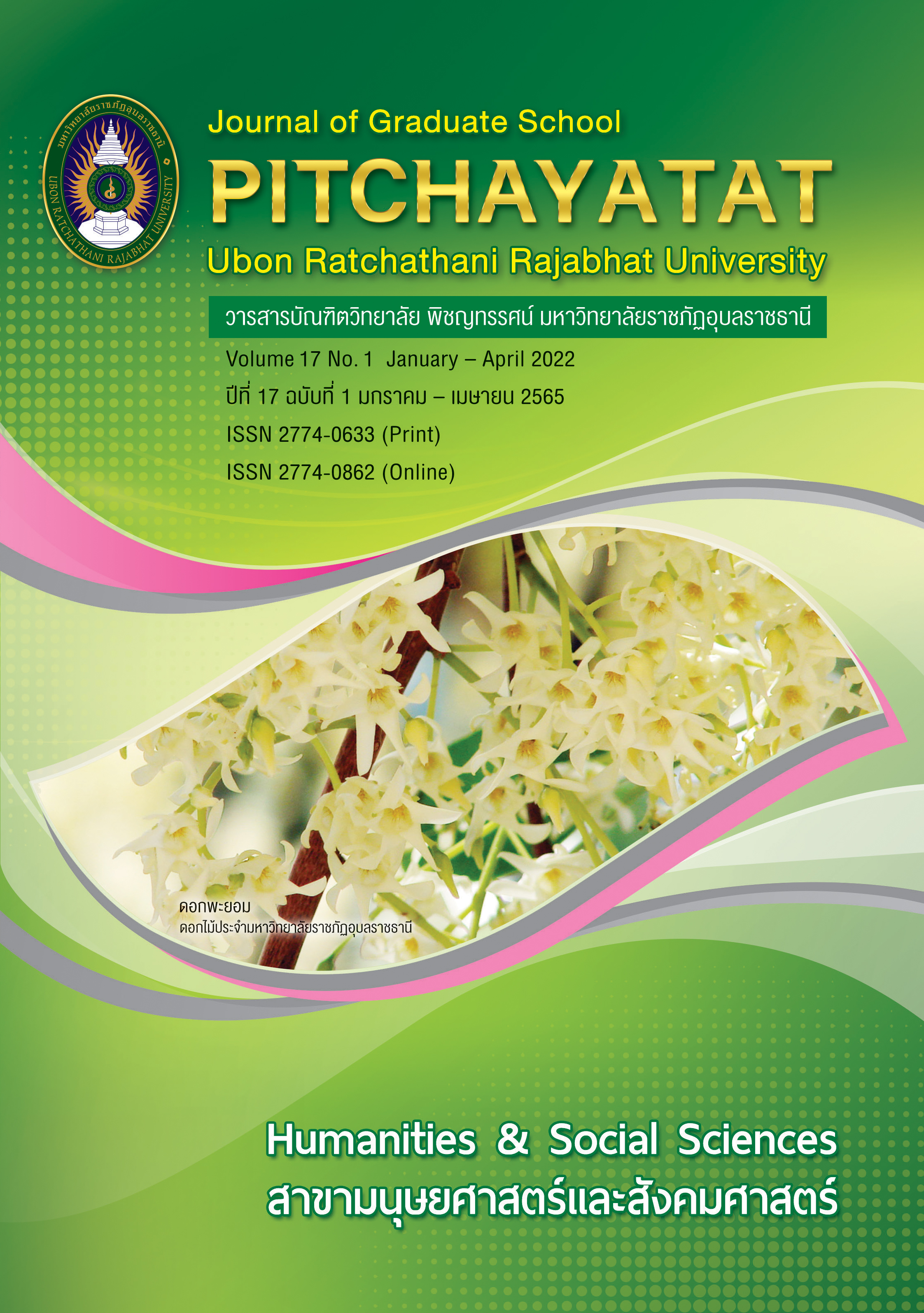การเสริมสร้างความร่วมมือขององค์กรเครือข่ายในการส่งเสริมการเป็นผู้เรียนรู้ตลอดชีวิตให้แก่ประชาชนในบริบทของการพัฒนาความเป็นพลเมืองไทย
คำสำคัญ:
ความร่วมมือ , องค์กรเครือข่าย , การเรียนรู้ตลอดชีวิต , ความเป็นพลเมือง , ผู้อำนวยการเครือข่ายบทคัดย่อ
การวิจัยนี้มีวัตถุประสงค์ 1) เพื่อศึกษาสภาพความร่วมมือขององค์กรเครือข่ายในการส่งเสริมการเป็นผู้เรียนรู้ตลอดชีวิตให้แก่ประชาชนในบริบทของการพัฒนาความเป็นพลเมืองไทย 2) เพื่อวิเคราะห์ความสัมพันธ์ขององค์กรเครือข่ายในการส่งเสริมการเป็นผู้เรียนรู้ตลอดชีวิตให้แก่ประชาชนในบริบทของการพัฒนาความเป็นพลเมืองไทย และ 3) เพื่อเสนอแนวทางในการเสริมสร้างความร่วมมือขององค์กรเครือข่ายในการส่งเสริมการเป็นผู้เรียนรู้ตลอดชีวิตให้แก่ประชาชนในบริบทของการพัฒนาความเป็นพลเมืองไทย กลุ่มเป้าหมายในการวิจัยคือ ผู้แทนองค์กรที่ลงนามความร่วมมือการส่งเสริมความเป็นพลเมืองเพื่อพัฒนาร้อยเอ็ดอย่างยั่งยืน จำนวน 8 คน กำนัน และผู้ใหญ่บ้าน จำนวน 8 คน เก็บข้อมูลเชิงคุณภาพโดยวิธีการสัมภาษณ์
ผลการวิจัยพบว่า
- ความร่วมมือขององค์กรเครือข่ายนั้นมีรูปแบบเป็นเครือข่ายกิจกรรมประเภทเดียวกัน มีลักษณะรวมตัวกันเป็นองค์กรเครือข่ายกลุ่มย่อยในแนวนอนเพื่อดำเนินกิจกรรมโดยมีเป้าหมาย มีผลประโยชน์และความสนใจร่วมกัน
- ความสัมพันธ์ขององค์กรเครือข่ายเป็นแบบรวมศูนย์แต่ขณะเดียวกันก็มีการสร้างเครือข่ายระหว่างองค์กรที่มีเป้าหมายเดียวกัน และ
- แนวทางในการเสริมสร้างความร่วมมือขององค์กรเครือข่ายในการส่งเสริมการเป็นผู้เรียนรู้ตลอดชีวิตให้แก่ประชาชนในบริบทของการพัฒนาความเป็นพลเมืองไทย แบ่งเป็น 2 ด้าน ได้แก่ 1) ด้านการบริหารจัดการรูปแบบความร่วมมือ ทำได้โดยการจัดตั้ง การเสริมพลังหน่วยงาน/องค์กรเจ้าภาพให้ทำหน้าที่เป็นผู้อำนวยการ(Facilitator) ของเครือข่าย และทำการสำรวจ จัดรวมกลุ่ม องค์กรเครือข่ายที่มีพันธกิจเดียวกัน โดยมีลักษณะการรวมตัวขององค์กรเครือข่ายในแนวนอน และร่วมกันออกแบบแผนปฏิบัติการในการส่งเสริมการเรียนรู้ด้วยวิธีการชักชวนประชาชนให้เรียนรู้ร่วมกัน รวมถึงลงมือทำกิจกรรมเพื่อการเรียนรู้ร่วมกับหน่วยงานองค์กรเครือข่ายต่าง ๆ และ 2) ด้านการบริหารจัดการความสัมพันธ์ ผู้อำนวยการของเครือข่าย (Facilitator) ต้องทำหน้าที่ในการเป็นตัวกลางเชื่อมความสัมพันธ์อันดีระหว่างองค์กรเครือข่าย สร้างความไว้วางใจ และให้ความช่วยเหลือ ในการทำงานเพื่อให้บรรลุเป้าหมายที่ได้ตั้งไว้ร่วมกัน
เอกสารอ้างอิง
ธนา ประมุขกุล. เครือข่าย. วารสารส่งเสริมสุขภาพและอนามัยสิ่งแวดล้อม ปีที่ 24 ฉบับที่ 3 กรกฎาคม–กันยายน, 2544.
ธีระพงษ์ แก้วหาวงษ์. กระบวนการเสริมสร้างชุมชนเข้มแข็ง : ประชาคม ประชาสังคม. ขอนแก่น: ศูนย์ฝึกอบรมและพัฒนาการสาธารณสุขมูลฐานภาคตะวันออกเฉียงเหนือ, 2543.
นฤมล นิราทร. การสร้างเครือข่ายการทำงาน: ข้อควรพิจารณาบางประการ. กรุงเทพฯ: สำนักพิมพ์มหาวิทยาลัยธรรมศาสตร์, 2543.
ประเวศ วะสี. พลังพลเมืองชาติไทย รัฐธรรมนูญกว่า 20 ฉบับ. (ออนไลน์) 2561 (อ้างเมื่อ 9 พฤษภาคม 2561). จาก: https://www.thairath.co.th/content/1258599
ปาริชาติ สถาปิตานนท์ และชัยวัฒน์ ถิระพันธ์. สื่อสารกับสังคมเครือข่าย. กรุงเทพฯ: สถาบันการเรียนรู้และพัฒนาประชาคม, 2546.
พฤฒ เอมมานูเอล ใบระหมาน. การสร้างความร่วมมือเพื่อต่อต้านการค้าแรงงานทาสบนเรือประมง. ภาคนิพนธ์ปริญญารัฐศาสตรมหาบัณฑิต สาขาการบริหารรัฐกิจ คณะรัฐศาสตร์ มหาวิทยาลัยธรรมศาสตร์, 2552.
วีระศักดิ์ เครือเทพ. เครือข่าย : นวัตกรรมการทำงานขององค์กรปกครองส่วนท้องถิ่น. กรุงเทพฯ: สำนักงานกองทุนสนับสนุนการวิจัย, 2560.
ศรเนตร อารีโสภณพิเชฐ. การพัฒนากลยุทธ์ความร่วมมือด้านการวิจัยทางสังคมศาสตร์ ของสถาบันอุดมศึกษาของรัฐ. กรุงเทพฯ: จุฬาลงกรณ์มหาวิทยาลัย, 2550
ส่งเสริมการเมืองภาคพลเมือง สถาบันพระปกเกล้า, สำนัก. รายงานโครงการปฏิบัติการเสริมสร้างพลังพลเมือง ประจำปี 2559-2560. กรุงเทพฯ: สถาบันพระปกเกล้า, 2561
สมคิด จาตุศรีพิทักษ์. บทบาทของพลเมืองกับการพัฒนาประเทศ. (ออนไลน์) 2558 (อ้างเมื่อ 9 พฤษภาคม 2561). จาก: https://www.somkid.com/article/542
Agranoff, Robert. Managing Within Networks: Adding Value to Public Organizations. Washington, DC: Georgetown University Press, 2007.
Agranoff, Robert and Michael McGuire. Collaborative Public Management: New Strategies for Local Governments. Washington D.C.: Georgetown University Press, 2003.
Agranoff, Robert and Michael McGuire. “Inside Collaborative Networks: Ten Lessons for Public Managers”, Public Administration Review, 2006, Special Issue (S1), December.
McGuire Michael. “Collaborative Public Management: Assessing What We Know and How We Know It”, Public Administration Review, 2006, Volume 66, December.Mumford V Troy and Marifran Mattson. “Will teams work?: How the nature of work drives synergy in autonomous team designs.”, Academic of Management, 2009, August.
Starkey, P. Networking for development. London: International Forum for Rural Transport and Development, 1997.
ดาวน์โหลด
เผยแพร่แล้ว
รูปแบบการอ้างอิง
ฉบับ
ประเภทบทความ
สัญญาอนุญาต
ลิขสิทธิ์ (c) 2022 วารสารบัณฑิตวิทยาลัย พิชญทรรศน์ มหาวิทยาลัยราชภัฏอุบลราชธานี

อนุญาตภายใต้เงื่อนไข Creative Commons Attribution-NonCommercial-NoDerivatives 4.0 International License.
บทความทุกเรื่องได้รับการตรวจความถูกต้องทางวิชาการโดยผู้ทรงคุณวุฒิภายนอกอย่างน้อย 3 คน ความคิดเห็นในวารสารพิชญทรรศน์เป็นความคิดเห็นของผู้นิพนธ์มิใช่ความคิดเห็นของผู้จัดทำ จึงมิใช่ความรับผิดชอบของวารสารพิชญทรรศน์ และบทความในวารสารพิชญทรรศน์สงวนสิทธิ์ตามกฎหมายไทย การจะนำไปเผยแพร่ต้องได้รับอนุญาตเป็นลายลักษณ์อักษรจากกองบรรณาธิการ





